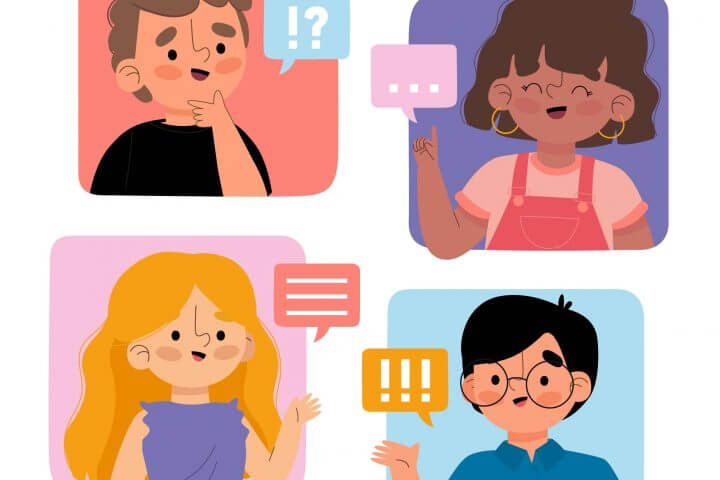What makes someone a good language learner?
I have been an English teacher for many years and have spent my life training and coaching language teachers as well. Along the way, though, I have also taken note of some of the habits that good language learners have.
A good LANGUAGE LEARNER…..
Enjoys the process: A good language learner is someone for whom language learning is a positive and fruitful experience. Obviously, there will be moments when you don’t feel like studying, but, generally speaking, it’s good if you enjoy the process!
Is motivated: Good language learners are highly motivated and therefore willing to do whatever it takes to learn a new language. Learning to speak a foreign language requires effort and consistency. The overwhelming desire to become fluent and achieve mastery pushes the learner along during the “tough times”.
Unslumps herself: On your path to success at anything, you will go through highs and lows. As this relates to language learning, you’ll go through these moments of euphoria when you think, “Oh my gosh, I speak so fluently” and other moments in which you think “What’s the point?” Muscling through those hard moments is crucial if you want to be a successful foreign language learner. Just like Dr Seuss says, “And when you’re in a Slump, you’re not in for much fun. Un-slumping yourself is not easily done.” But “done” it must be!
Is open to ambiguity: The continual partial and gradual unfolding of meaning and nuance can be difficult to bear. You might want to throttle your teacher when she says, “Well, it sometimes means this, but then at other times…” Language is complex and learning is incremental, so good language learners adapt and “live the mystery” – they accept that partial knowledge is better than no knowledge.
Is persistent: Rome wasn’t built in a day and all that. I have worked in the field of L2 acquisition (foreign language instruction) and have seen firsthand how long it takes to become good at a language. Please don’t believe all of these charlatans out there who promise you that you will learn a language in some miraculous “sprint” or “marathon”. It takes time. And practice. You don’t have to be particularly smart or talented – you just have to put in the work. “Hard work beats talent when talent doesn’t do the work.”
Gets exposure to a variety of inputs: When you study a foreign language, always try to find different sorts of input in the language – online newspapers, TV shows, cartoons, songs, comic books, websites, instructional manuals, anything you can get your hands on. And when you expose yourself to the input, at the beginning at least, find satisfaction in understanding one or two words, or a percentage of what you have read or heard. I remember when I was learning French, I was so delighted when I was able to understand the word “AVEC” (with). I was surrounded by Parisians saying all sorts of stuff and here I was like, “Yoo-hoo! I understood ‘avec’!”
Is curious: The best language students are the ones who notice EVERYTHING. First you said “questo,” but then you said “quello”? Why? The more you nurture attention to details and keep these nuggets in your memory banks, the greater will be your ability to capture the nuances and shades of meaning in a foreign language. You may notice more things than you are able to assimilate in that moment, but you will be a more agile and intelligent learner for it.
Looks for Gist & Detail: Listening and reading are for obvious reasons known as “passive skills.” When you are trying to understand speech or the written word, keep in mind that there are two things going on at the same time. On the one hand, you are trying to get the “general idea” – the essence of the written or spoken message. On the other, we are attempting to understand facts and details. Our brain does this without our even realizing it but when we learn a foreign language, we start to see how both can easily elude us. With your teacher, you will perform many listening and reading activities to hone these abilities.
Has realistic expectations: As in all things, we need to realize our limitations, but also our possibilities. Talk to your language school or teacher about this. How much time will it take you to achieve your desired results? What is it that you would like to do? In my experience, it is better to start off with humble expectations so that you are positively surprised by the good results. I have seen many an overly-ambitious student give up at the first sign of difficulty, whereas the plodder with small expectations ends up continuing and growing her skills to the level of proficiency. Disappointment kills motivation and without motivation, it can be difficult to put in the time and work necessary.
Is interested in the culture of the language: A foreign language is a product of its culture and history. As you progress in your knowledge of the language, awareness of its culture goes hand in hand with your understanding of its idiomatic expressions, proverbs and every-day vocabulary. And culture is a very broad term – it could just as easily be television, as it could literature, music, social media or customs and traditions.
Is not worried about what other people think: Finally, a good language learner tends not to worry too much about what people think of them. Whether you are trying to replicate a French “R”, or roll that “R” like an Italian, or you are trying to use the correct tone in Mandarin, it’s important not to be worried about appearances. It takes time to learn the correct pronunciation and the road to intelligible communication is paved with failed attempts.
Loves to “FAIL” – If by FAIL, you mean “FIRST ATTEMPT AT LEARNING”
Ciao Languages is an online foreign language school based in Orange County, California. We work with highly-trained and experienced foreign language instructors and specialize in creating a hi-touch virtual classroom presence. For more information about our courses, please reach out to us via our contact page or call us at (949) 478 – 1786. We teach a wide variety of languages, such as English, French, Italian, German, Spanish, Portuguese, Arabic, Japanese, Chinese, Vietnemese, Korean and Hindi.




